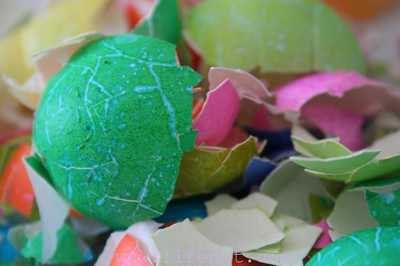
This piece is contributed by Gary Villa, Spiritual Director of the Chesterton House.
On a shelf in my bedroom sits a broken pastel blue-and-yellow-colored egg shell , the remnants of the first gift I ever gave my wife, Kira. Shortly after she came to faith, we colored Easter eggs together at her kitchen table. I made a small gift to her of my “art”, an egg with crudely drawn sun, moon and stars. It was kept whole for years, through 3 apartment changes and into our current home. Finally broken by the curious hands of our first son, we keep what remains as a tangible reminder of that early date and the beginning of our love.
As I sometimes lead post-dinner conversations in the Chesterton House residential communities, I often look for ways to provoke the students to tell each other more of their own stories, who they are and what brought them here to this place. One of my favorite ways of doing this is inviting them to bring an object of their own to the table as a kind of show-and-tell. Somehow it is easier to talk about yourself when you’re holding a purple plush eggplant or a camera or a favorite pen. The items are as varied and different as our residents.
In the lovely first chapter of John’s gospel, the apostle describes Jesus as the creator of all things. But he uses an unusual term: the “Word” or put another way, the self-expression of God. John says that all things (!) were made through him, and without him was not any thing made that was made (John 1:3, ESV). How beautiful! There is nothing you can find that is not in some way tinged with the marks of God’s self-expression to us. His nature, his character, his power are somehow woven into the stuff of our lives, even in this sin-broken world.
Because of this we can have not just permission, but freedom and joy as we work in whatever field we find ourselves in. If “all that is” is somehow the product of God’s self-expression, we can be confident that something of Him can be known in any field of study or work. All our work – mathematics, art, science, engineering – becomes a theological endeavor. We learn of God as we learn of his world. And, what’s more, all of our work also then becomes doxological for us as well – an act of worship. We can with joy respond to God in worship as our knowledge of him grows and deepens through our vocation. The cosmos is God’s show-and-tell to us.
Of course, like the egg shell I gave my wife, the cosmos is broken. The earth that was given to us to rule and care for was just as broken by Adam’s sin as we are. It, too, is tainted everywhere by sin’s rule and effects. But Paul tells us that the gospel is good news not just for humanity, but for all of creation. The same Jesus who created all things for himself (Colossians 1:16) reconciled all things to himself by the blood of his cross (1:20). The redemptive sweep of the gospel is cosmic, not just personal.
The vision is compelling: the earth, the universe – all that God has made exists not merely as a backdrop for humanity but as a good thing in itself. God declared it to be good at creation and reconciled it to Himself at the cross. For this reason, we are free to declare vocations of every kind not only good, but Christian. Science, education, agriculture, engineering, health – these are all Christian vocations. These are things that God cares about. It is our privilege to work – wherever God has called us – to His glory and as a demonstration of His intentions for the world.
Gary Villa, a staff member of New Life Presbyterian Church, serves part time as the Spiritual Director of Chesterton House. Gary earned his BA in International Ministries from the Moody Bible Institute in 1996, and later obtained his MA in Interdisciplinary Studies (church history/spiritual formation) from Wheaton College in 2006. His interests include baseball, poetry, jazz, and gluten-free baked goods. Gary and his wife Kira, a doctoral student in Applied Economics at Cornell, have one son, Aidan.

